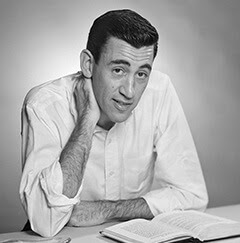Jerome David Salinger - Biography and Works
https://www.thelifeandnotes.com/2023/07/jerome-david-salinger-biography-works.html
Jerome David Salinger, one of the most famous American writers of
the 20th century, is a novelist and short story writer. Here is the biography
and works of Jerome David Salinger...
Born: January 01, 1919, New York, USA
Died: January 27, 2010 (age 91), Cornish-New Hampshire, USA
Profession: Novel and short story writer
Nationality: American (USA)
Jerome David Salinger, was born on January 1, 1919 in New York
City. Known for his reclusive nature, Salinger made a profound impact on
literature with his works, particularly his iconic novel "The Catcher in
the Rye."
Salinger grew up in Manhattan, the second child of a Jewish father
and a Scotch-Irish mother. His father, Sol Salinger, was a successful importer
of kosher cheese, while his mother, Miriam Jillich Salinger, worked as a
fashion saleswoman. As a child, Salinger showed an early interest in writing
and literatüre.
After attending various preparatory schools, Salinger entered the Valley
Forge Military Academy in 1934. Following his time at the academy, Salinger
attended New York University, where he continued to explore his writing skills.
In 1941, at the age of 22, Salinger began his writing career in
earnest. He published his first short story, "The Young Folks," in
Story magazine, which was well-received. This initial success fueled his
determination to become a professional writer.
He joined the American army in 1942 after the United States
entered World War II. He worked in the department where German and French
detainees were interrogated in the Normandy camp.
Salinger's wartime experiences profoundly impacted his writing and
his outlook on life. The horrors of war deeply affected him, and he witnessed
firsthand the devastating effects of violence and human suffering. These
experiences would later shape his distinctive literary voice.
After the war, Salinger continued to write short stories for various literary magazines. In 1948, he achieved significant recognition with
the publication of "A Perfect Day for Bananafish" in The New Yorker.
However, it was Salinger's novel "The Catcher in the
Rye" that brought him enduring fame. Published in 1951, the novel revolves
around the character of Holden Caulfield, a disillusioned and alienated
teenager navigating the complexities of adolescence and adulthood. Holden's
rebellious spirit and disdain for societal conventions resonated deeply with readers,
making the novel an instant classic.
"The Catcher in the Rye" catapulted Salinger into the
literary spotlight. However, the sudden fame and attention troubled him, and he
grew increasingly reclusive. Salinger withdrew from public life and avoided the
media, granting only rare interviews. Despite Salinger's
reclusive nature, his impact on literature and his influence on subsequent
generations of writers cannot be overstated.
Salinger's subsequent works, including the novellas "Franny
and Zooey" (1961) and "Raise High the Roof Beam, Carpenters and
Seymour: An Introduction" (1963), further explored the themes of
alienation, spirituality, and the search for authenticity.
Jerome David Salinger passed away on January 27, 2010, leaving
behind a lasting literary legacy.
List of Works
Books
- The Catcher in the Rye (1951)
- Nine Stories (1953)
- Franny and Zooey (1961)
- Raise High the Roof Beam, Carpenters and Seymour: An Introduction (1963)
Collected short stories
- Three Early Stories (2014)
- The Complete Uncollected Short Stories of JD Salinger, Vol. 1&2 (1974)
Published stories
- The The Hang of It (1941)
- The Heart of a Broken Story (1941)
- Personal Notes of an Infantryman (1942)
- The Varioni Brothers (1943)
- Soft-Boiled Sergeant (1944)
- Last Day of the Last Furlough (1944)
- Elaine (1945)
- I'm crazy (1945)
- A Young Girl in 1941 with No Waist at All (1947)
- The Inverted Forest (1947)
- Blue Melody (1948)
- Hapworth 16, 1924 (1965)
JD Salinger did not publish any work after the story "Hapworth 16, 1924", which appeared in the New Yorker magazine in 1965.
More From thelifeandnotes

